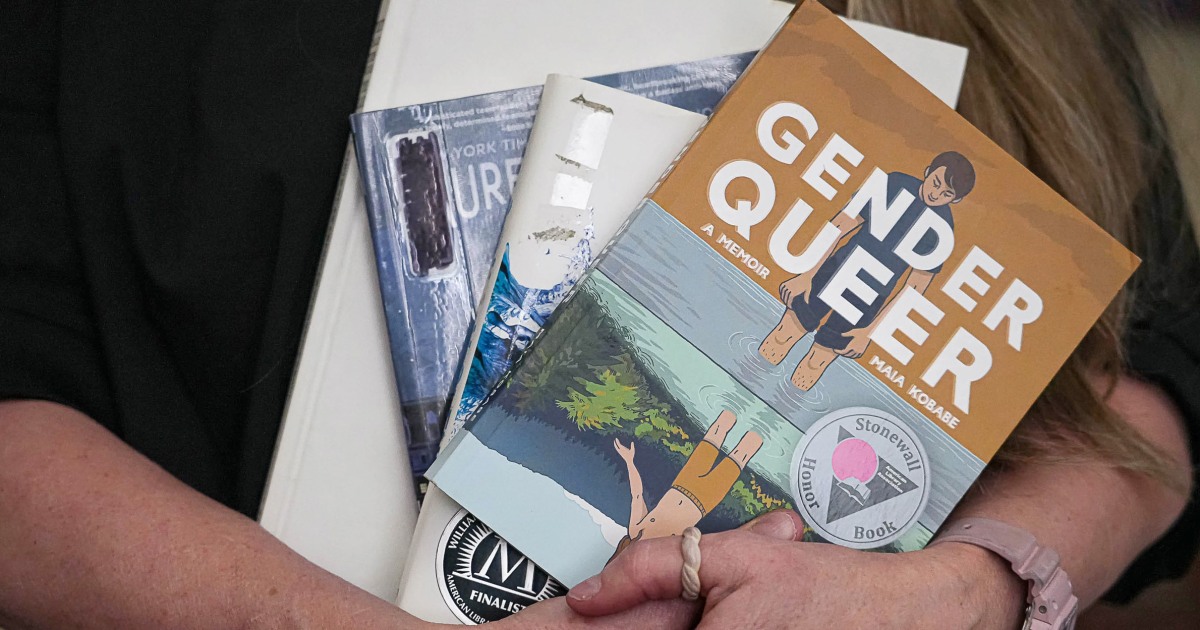Two reports released Monday provide a mixed but compelling outlook on the wave of book removals and challenges as the annual Banned Books Week begins for schools, stores and libraries nationwide.
The American Library Association found a substantial drop in 2024 so far in complaints about books stocked in public, school and academic libraries, and in the number of books receiving objections. Meanwhile, PEN America is documenting an explosion in books being removed from school shelves in 2023-24, tripling to more than 10,000 over the previous year. More than 8,000 were pulled just in Florida and Iowa, where laws restricting the content of books have been passed.
The two surveys don’t necessarily contradict each other.
Efforts to censor books in public libraries in the United States have skyrocketed in the past four years, but the ALA’s new report shows that the pace has slowed in the first eight months of the year.
From Jan. 1 to Aug. 31, there were 414 reported attempts to censor library materials or services across the country, with 1,128 different titles criticized, compared with 695 similar challenges involving 1,915 books during the same period last year, according to a preliminary report released Monday by the association.
In a news release, the association cautioned that although the number of challenges has dipped, the number of challenges “continues to far exceed the numbers prior to 2020.”
Deborah Caldwell-Stone, the director of the ALA’s Office for Intellectual Freedom, also noted that book challenges may have declined slightly because targeted books have already been removed. And she added that these censorship efforts “significantly ticked up” again when most children returned to school after Labor Day.
“We are still seeing the impact of organized, coordinated campaigns to rid school library shelves and public library shelves that deal with the voices and concerns of marginalized groups, that want to eliminate books that don’t match their moral or political agendas, and it’s having a real impact, especially on young people’s access to information and ideas,” Caldwell-Stone said in a phone call.
She noted that about 50% of the challenged books were about or written by people of color or people who identify as LGBTQ.
In 2023, the library association’s list of the 10 most challenged books nationwide included Toni Morrison’s “The Bluest Eye,” a novel about a young Black girl who grew up following the Great Depression; Maia Kobabe’s “Gender Queer: A Memoir,” a graphic memoir about the author’s exploration of gender identity from adolescence to young adulthood; and George M. Johnson’s “All Boys Aren’t Blue,” a coming-of-age memoir about a queer Black man.
The ALA attributed the decline in book challenges in the first eight months of 2024, in part, to the work of anti-censorship activists and “success in courts” against laws that restrict book access.
This month, a school district in Nassau County, Florida, had to return 36 books related to race and the LGBTQ community to school libraries as part of a settlement reached with authors, parents and students. The district’s school board removed the books from its libraries last year after the titles were challenged by a local conservative advocacy group.
Caldwell-Stone also credited young Americans for “leading the fight to persuade local governments to not engage in censorship and advocating for the freedom to read.”
“There’s this idea that minors shouldn’t be able to access things in the library,” Caldwell-Stone said. “But, you know, the First Amendment protects the rights of minors as well.”
While the ALA’s report shows signs of book challenges abating, objections to certain titles still persist.
Lawmakers in at least 13 states this year have introduced legislation that could disrupt libraries’ services and censor their materials, according to an NBC News tally.
The New College of Florida made national headlines last month after it tossed hundreds of books in the trash, with many of the discarded titles appearing to be related to LGBTQ issues, race and women’s rights. Last month, the Utah State Board of Education also issued a list of 13 books it was banning from school libraries statewide, including “Forever” by Judy Blume and “Oryx and Crake” by Margaret Atwood.
The library association defines a “challenge” as a “formal, written complaint filed with a library or school requesting that materials be removed because of content or appropriateness.” The ALA doesn’t keep a precise figure of how many books have actually been withdrawn.
According to PEN, bans are tallied through local media reports, “school district websites, and school board minutes, as well as organizational partners” such as the Florida Freedom to Read Project and Let Utah Read. The ALA relies primarily on local media and accounts from public librarians. And the two organizations have differing definitions of “ban,” a key reason their numbers vary so greatly. For the library association, a ban is the permanent removal of a book from a library’s collection. Should hundreds of books be pulled from a library for review, then returned, they are not counted as banned, but listed as a single “challenge.”
For PEN, withdrawals of any length qualify as bans.
“If access to a book is restricted, even for a short period of time, that is a restriction of free speech and free expression,” said Kasey Meehan, who directs PEN’s Freedom to Read program.
Like the ALA, PEN said a large portion of the books targeted have racial or LGBTQ themes.
Banned Books Week, which runs through Sunday, was established in 1982 and features readings and displays of banned works. It is supported by the ALA, PEN, the Authors Guild, the National Book Foundation and more than a dozen other organizations.
For more from NBC Out, sign up for our weekly newsletter.


